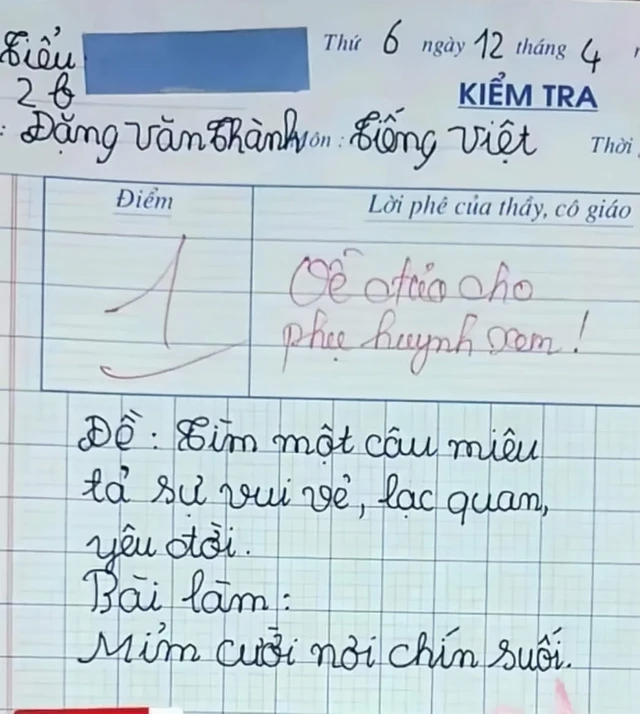This entertaining Vietnamese language exercise from a second grader has gone viral a few months ago, sparking lively discussions online. The task, set by the student’s teacher, was to “find a sentence that describes happiness, optimism, and a love for life.” While this might seem like a straightforward assignment for primary school students, the boy’s response was unexpectedly witty and unique.
The student’s answer consisted of just five words: “Smiling in the ninth level of hell.” This intriguing response left many assuming that the teacher was shocked, hence the student receiving only one point for this task.

While the boy’s answer technically met the criteria, it conveyed a rather negative message. This may explain why the teacher gave the student a low grade and suggested that the student’s parents review the work.
When this second grader’s work was shared on social media, it left the online community in stitches. Many admitted that the student’s description was indeed “out of the box” and something they wouldn’t have easily thought of.
Literature, it must be said, is a challenging subject that requires constant language development, knowledge acquisition, and life experiences. However, it offers immense benefits, enriching children’s lives in numerous ways.
It opens doors to a world of imagination, fostering their thinking skills, communication abilities, and empathy. Through literature, children learn to view life from multiple perspectives, shaping their character and individuality. Literature is not just a subject; it’s a journey of self-discovery and exploration of the world around us.
So, how can we help children excel in literature?
Read Daily
Reading books is one of the most effective ways to enhance language skills. It exposes children to a rich vocabulary and expands their knowledge of the world. Through literature, they can explore different cultures, perspectives, and life situations. This not only stimulates their critical thinking skills but also fuels their imagination.
When children read a story, they don’t just absorb information; they learn to feel and understand the emotions, characters, and underlying messages on a deeper level.
Develop Writing Skills
Writing is essential for children to organize and express their thoughts clearly. Parents can encourage children to keep daily journals or create short stories, helping them develop logic and idea structuring. Writing improves grammar, vocabulary, and self-expression, boosting children’s confidence in their abilities.

Illustration
Encourage Creativity
Creativity is key to developing a unique writing style and making learning enjoyable. Parents can organize short story or poetry writing sessions, creating a fun atmosphere that fosters self-expression. When children are free to create, they become more engaged and develop independent thinking skills. Creativity also teaches them to embrace failure and find innovative solutions, equipping them with essential life skills.
Engage in Literary Activities
Participation in literary clubs, presentations, and writing competitions is crucial for language and communication development. These platforms offer children opportunities to interact, share ideas, and listen to their peers’ perspectives, enhancing their critical thinking and confidence. Presentations refine their skills in organizing thoughts and expressing them clearly, which is vital for their academic and future success.
Writing competitions stimulate creativity, encourage feedback reception, and foster a healthy competitive spirit. Moreover, connecting with fellow literature enthusiasts brings joy and creates a support network, facilitating holistic growth and learning.





































